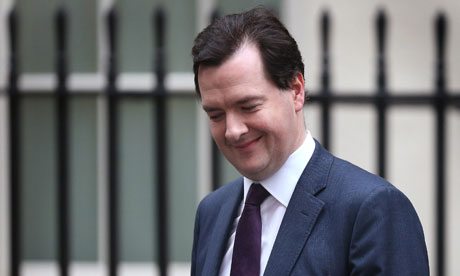The chancellor, who played down a risk to the UK’s AAA credit rating, is on a media tour after his Autumn Statement, reports The BBC.
He rejected criticism from the shadow chancellor, saying Mr Balls, with Gordon Brown, had created the “mess”.
But Mr Balls said policy was hitting working families and it was time to change the UK’s economic course.
Britain was facing a “tough economic situation… but it could be much worse,” Chancellor George Osborne told BBC Breakfast.
He said he had “taken action in a very difficult situation”, on areas such as pensions, benefits, and businesses.
Labour says a working family with children on £20,000 a year would lose £279 a year from April.
But the Treasury dismissed the claims such families would be worse off as a result of changes to tax and benefits announced in the Autumn Statement.
On Wednesday the Fitch agency said the UK’s AAA credit rating was under threat after the chancellor said the coalition would miss its debt reduction target.
A cut to the credit rating would mean that the country is perceived as more risky to lend to, thereby raising the cost of borrowing from international investors.
Asked about that move on BBC Breakfast, Mr Osborne said: “It wouldn’t be a good thing but the credit rating is one of a number of ways in which people look at countries.”
In his Autumn Statement Mr Osborne announced a fresh squeeze on benefits, as he admitted the UK economy was performing less well than expected.
Most working age benefits, such as Jobseekers Allowance and Child Benefit, will go up by 1%, less than the rate of inflation, for the next three years.
A bill limiting benefit increases is expected to be introduced in the Commons this month, ministers have said.
Labour has not yet said whether it will vote against the government, but Mr Balls is pointing out that many of those in receipt of benefits are not unemployed, but are in low-paid work, and that statutory maternity pay will also be limited to a 1% increase.
While austerity measures will be extended to 2018, Mr Osborne also announced more money for roads and schools and axed a planned 3p fuel duty rise.
He said “turning back now would be a disaster” for the UK. But Labour said his credibility was “in tatters”.
Shadow chancellor Ed Balls accused Mr Osborne of breaking his own rules, on which his credibility depended.
“After two and a half years we can see, and people can feel in the country, the true scale of this government’s economic failure,” Mr Balls told MPs,
He said the average family with children on £20,000 a year would be “worse off” – even with the personal allowance changes.
Mr Balls claimed Mr Osborne’s plan to raise £1bn from pension tax relief on the well-off raised less than £1.6bn given away in Mr Osborne’s first Budget on the same reliefs.
But the chancellor said the measure proved “we are all in it together”.
Mr Osborne had said debt would start falling as a proportion of GDP by 2015/16 – the year of the next general election.
But he has been forced to delay that target by a year because of the worse than expected state of the economy, which is now expected to shrink this year by 0.1%.
UKIP’s Godfrey Bloom was critical of measures announced in the Autumn Statement, saying the country was “going to be stuck in a permanent recession until the chancellor cuts spending”.
“He hasn’t cut public spending at all. In fact, it’s either flat-lining or slightly moving up. He’s borrowing a further hundred billion pounds a year. Every pound that he spends, 18 pence goes to service the debt. So until he makes some very serious attempts to cut public spending we’re going to be locked in this recession for some time”.


